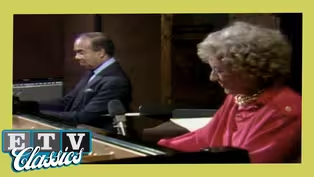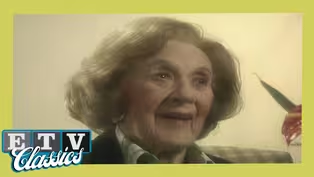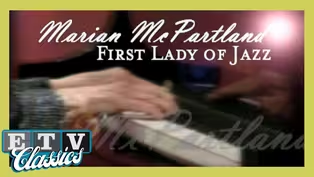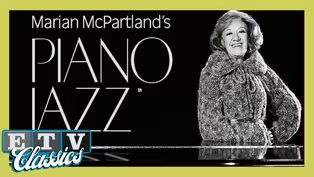ETV Classics
Art's the Thing! with Marian McPartland (1984)
Season 3 Episode 21 | 17m 22sVideo has Closed Captions
Marian McPartland plays a piece by Mercer Ellington followed by an interview with host Beryl Dakers.
In this "Art's the Thing!" special, Marian McPartland plays Mercer Ellington's "Things Ain't What They Used To Be." Next, McPartland is interviewed by host Beryl Dakers. McPartland talks about her Peabody Award-winning show "Piano Jazz", as well as her inspirations and love for the genre of jazz music.
Problems playing video? | Closed Captioning Feedback
Problems playing video? | Closed Captioning Feedback
ETV Classics is a local public television program presented by SCETV
Support for this program is provided by The ETV Endowment of South Carolina.
ETV Classics
Art's the Thing! with Marian McPartland (1984)
Season 3 Episode 21 | 17m 22sVideo has Closed Captions
In this "Art's the Thing!" special, Marian McPartland plays Mercer Ellington's "Things Ain't What They Used To Be." Next, McPartland is interviewed by host Beryl Dakers. McPartland talks about her Peabody Award-winning show "Piano Jazz", as well as her inspirations and love for the genre of jazz music.
Problems playing video? | Closed Captioning Feedback
How to Watch ETV Classics
ETV Classics is available to stream on pbs.org and the free PBS App, available on iPhone, Apple TV, Android TV, Android smartphones, Amazon Fire TV, Amazon Fire Tablet, Roku, Samsung Smart TV, and Vizio.
Providing Support for PBS.org
Learn Moreabout PBS online sponsorshipMore from This Collection
Marian McPartland was the host of Marian McPartland’s Piano Jazz, the popular Peabody Award winning NPR series which celebrated more than 30 years on the air.
Marian McPartland's Piano Jazz with Bobby Short (1986)
Video has Closed Captions
Marian McPartland welcomes the king of cabaret singers- Bobby Short! (57m 51s)
The Big Picture with Marian McPartland (2007)
Video has Closed Captions
Marian McPartland prepares to premiere her composition, “A Portrait of Rachel Carson". (26m 49s)
First Lady of Jazz Marian McPartland (2012)
Video has Closed Captions
Follow the amazing journey of the jazz loving English teenager with a gifted musical ear. (26m 47s)
McPartland and Brubeck: A Piano Jazz Special (2001)
Video has Closed Captions
Marian McPartland and Dave Brubeck piano concert. (56m 41s)
Providing Support for PBS.org
Learn Moreabout PBS online sponsorship♪ ♪ ♪ ♪ ♪ Beryl> Hello, I'm Beryl Dakers, inviting you to join us for this special edition of Arts the Thing.
There's nothing like having your own special concert.
Especially when the musician is the one and only Marian McPartland.
♪ ♪ ♪ ♪ ♪ ♪ ♪ ♪ ♪ ♪ ♪ ♪ ♪ ♪ Beryl> While the tune may be Ellington's, but the style is unmistakably McPartland, Marian McPartland, that is, the First Lady of Jazz, and definitely a pianist, pianist.
We are so happy to have you with us today.
Marian> Thank you, Beryl.
Beryl> How are you?
Marian> I'm fine.
Nice to be here.
Beryl> Well, sort of as a testament, I suppose, to your extraordinary versatility with the keyboard, the Marian McPartland Piano Jazz series this year captured the Peabody Award.
And certainly among broadcasters, that is a most distinguished accomplishment.
Congratulations.
Marian> Thank you.
Needless to say, I was very thrilled, surprised and then thrilled and delighted and, I'm just very happy about that.
And since that time, we did get another award from the, International Radio Festival of New York, a gold medal.
So, that's kind of exciting, too.
Beryl> It certainly is, especially for us since this series is produced by South Carolina Educational Radio.
Did you have any doubts that a series like that would go over?
Marian> I tell you Beryl, I really never thought it would become, 6-, like 65 shows, like when we did the first series, which was the 13 shows.
And I, I thought, well, this has been great.
And I've loved doing it and that's it.
And then along came a second series, And then I'm thinking, do I dare hope that there'll be a third?
And all of a sudden there's five.
And, you know, we hope it'll still go on.
Beryl> Now, you have been quoted as saying that jazz will perhaps always be a minority music and that you really have to be attuned to that kind of music.
But the series doesn't seem to support your thesis.
Marian> Well, in what way?
You mean, you mean by the number of listeners that it has?
Beryl> A mass appeal.
It just seems to be something that people really tune in to hear.
Marian> Well, but I think that kind of does bear out my theory, because they have to know it's on and find it on the dial.
And it's on a certain time.
It isn't something you can just be going along in the car and you tune in and then you don't like that and you change stations, you know.
I think it has to be for a group of dedicated people who love jazz, and they're going to take all the different styles and the different, variety of pianists that I have on, because it's a big thrill for me to come into such close contact with them.
Well, Oscar Peterson, Teddy Wilson, Mary Lou Williams, Joanne Brackeen, all these people.
Beryl> So all of the truly greats of the piano, keyboard.
Do you ever worry about the mix of styles, at all?
Marian> Well, I don't have to worry, because I know that there are so many different kinds of fans out there, some who like more traditional music, and then we have somebody for them, like Norma Teagarden or Stacy, somebody who loves Bill Evans that we had because we were fortunate enough to have Bill Evans before he passed away.
So I'm lucky, and as much as I can fit to a certain extent into any style, I like to play in different styles.
So that when the guest is there, I hope I'm not going to get in their way or fall all over myself, accompanying them when we do the duets.
Beryl> Is that a conscious effort on your part?
Do you find that you just easily adapt to another style or?
Marian> Yeah.
Yeah, I think it's probably because I've listened to all these people, Or most of them for so many years now.
Somebody like Stanley Cowell, that was a new person.
And, actually that was a very exciting show.
I, some of these people that I've known for many years, like Art Hodes and, you just...kind of fit in.
I just know, like, you know, I couldn't really describe how was I think maybe what I, what I might leave out would be as important as what I'd put in.
Beryl> And you do that in a way that your guests will also shine and feel comfortable.
Marian> Try to.
Well, I know how I'd feel if I was sitting there, you know, I'd just like to try to make them feel as good as possible.
Beryl> Since you do play just about any kind of music and do it so well, is there a particular favorite?
If you could just choose?
Marian> A tune you mean?
Beryl> A tune, a style.
Marian> Oh,...a style.
Well, I suppose I'm probably the all time, Bill Evans fan of the world.
That's not to say that I don't enjoy and appreciate other styles.
I mean, I at home in England years ago, I really got a great education listening to Joe Sullivan and Teddy Wilson, Bob Circe, Mel Powell, who I've been trying to get on the show, by the way, and, Art Tatum, of course.
And since then, since I've been over here, Oscar Peterson, George Shearing, you know, there's there's so much in music and there's so much that's different in all these people.
And to be able to, absorb some of it myself, you know, it's really an education for me.
Beryl> I have often wondered how women in a field dominated principally by males, feel when they get comments like, I've read about you, such as she plays like a man.
Is that a compliment to you?
Marian> Well, thank God they don't say that anymore.
That's something that used to be said, and I guess years ago I was so happy to get a compliment or what I thought was a compliment.
You know, I just would be pleased.
But then afterwards, I started to think, gosh, I wonder what that, does that mean, they think I'm very, forceful and, strong and maybe there's something not too complimentary there, but, gradually that people stop saying that.
Or the other one was, you play good for a girl.
That's another one.
But those things seem to have gone away.
Nobody.
But there may be somebody out there thinking it, but they don't say it anymore.
Beryl> No.
Does that mean, then, that you feel women have sort of come into their own in this field?
Marian> I think they have, but, but of course, they were always there.
I mean, when you think of people like Lila Armstrong, Larry Austin, the lightest snow, all the people were such wonderful players years ago and the band, bands like the International Sweethearts of Rhythm and, now, of course, there are people playing every instrument.
I guess years ago it was tough for a girl trumpet player because, or trombone player because it wasn't thought to be nice or a girl drummer.
In fact, there are some people I think, still have a little trouble with that.
Seeing a girl playing a horn.
But, I'm happy that they have all been able to come into their own.
And I think there'll be a lot more women musicians coming up continually now, don't you?
Beryl> I certainly hope so.
What makes a piece, a standard for you?
What makes it the kind of piece you want to play?
Marian> Sometimes it's hearing somebody else's version of it.
Sometimes it's knowing the lyric or a combination of both.
Some tunes.
I just know, sort of by osmosis.
I've never seen the music.
I know thousands of tunes that I learned, years ago off the BBC, and they just stayed with me.
Beryl> You mean you would just hear them and then you could sit down and play them?
Marian> Yeah, sure.
I've always, not entirely accurately, but, maybe not entirely accurately, but, most of the tunes, I think I that I know pretty well, I have learned by ear and, and still do, although I can struggle through a piece of sheet music.
Beryl> Struggle through a piece.
That's an understatement.
If I've ever heard one.
You also play with symphonic bands and, in concert halls on occasion.
Marian> Yes.
A lot.
Beryl> Are you as comfortable in that setting?
Marian> I am now because, for a while I was doing some classical things.
I was doing Rhapsody in Blue and, as part of my program, and or I would do the Greek Concierto, but, I have a lot of other things, like Gershwin and Duke Ellington and some pieces of my own arranged for symphony orchestra.
I've got a big repertoire of pieces to choose from, so I've just decided to give the Griegan Rhapsody a rest for a little while, Beryl> while you advance the cause of jazz thing.
Marian> Yeah, exactly.
Try to.
Beryl> You do a lot of workshops for children as well, and that seems to me, an interesting thing for someone who is as busy as you are doing the other kinds of things, why spend so much time with them?
Marian>I suppose you could say part of it is a selfish reason.
I mean, it's, it's our new audience coming up, and I really feel that they should be exposed to jazz in the same way as they are to ballet and opera.
I mean that the kids, these are considered, obligatory kind of outings, you'd take a bunch of school kids to the opera or to the ballet, because it's cultural.
But so is a jazz concert.
But, so if they don't take them out to a jazz concert, I just as soon bring one into the school.
And, it started years ago.
And when I started playing in a, in a school, in the 1950s, and I asked for a request from the kids, and one kid hollered out, You Ain't Nothing But a Hound Dog .
And I thought, my goodness, if this is all they listen to, I should try to let them know there's a Duke Ellington and Coleman Hawkins and, and, a Count Basie and all the other great jazz people.
Beryl> So you played this... Hound Dog, and led into something else?
Marian> I never I've always got away without playing, You Ain't Nothing, But a Hound Dog , and I've never played, Tie a Yellow Ribbon .
I've somehow managed to wriggle out of it and play something else.
But there's some nice things to play now, because the theme for M.A.S.H.
makes a very good jazz tune.
You play that and they all dig it.
And, once you, once you play something that they know and you, they know you're in their corner, then you can start doing other things and finally get around to, playing things perhaps they haven't heard before.
Beryl> The children are fairly open minded that way.
Do you find that the other, that adults who tend to be more, for want of a better word, more elitist in their musical tastes?
Marian> Set in their ways?
Beryl> There you go.
Respond the same way.
Marian> Well, adults, of course, they have all their favorites.
Oh, why didn't you play Mountain Greenery?
Why don't you play?
So and so, you know, they have a Satin Doll and Misty and there's so many other beautiful tunes that while you're playing those particular ones, you're also thinking of others, maybe less well-known that you'd like to play.
But little kids are the most open, like kindergarten, first grade, and through grade school.
They're, they're so open they'll just accept whatever you offer them.
So naturally, it's up to us to give them the best we can.
Beryl> When one is able to sit down and play the way you can, or to improvise at the drop of a hat, are you able to play a piece the same way twice?
Marian> Not if I can help it.
It's sort of if you're playing chess, I think it's, at least from my thinking, you're supposed to try to do it in a fresh, and new way every time.
But of course, that's hard to do.
You do tend to drop into certain habits and cliches and I like to change key a lot so I can get away from that.
Beryl> Just setting up little challenges as you go.
Marian> Yeah, because I do tend to play some tunes, the same way.
but people want to hear them the same way that, that's, that's sort of a trap.
And, Erroll Garner, I mean, if he had ever tried to deviate from that style, I'm sure he would have would have had a terrible time because people would say, "Oh, it doesn't "sound like the record or it doesn't sound like Erroll" So in a way, I think I'm happy that I haven't fallen into some really, well known style.
This way I can keep changing around and jumping from place to place, Beryl> And that in itself has become your style, that she can adapt and do these other things.
Marian> Maybe.
Beryl> Marian what would you like to do now, having done, the recordings, writing the music, becoming as well known?
What would you like to do with your music at this point?
Marian> Write more, compose more.
I'm working on a, a symphony piece, something that might take the place of Rhapsody in Blue .
Or maybe, I mean, in terms of length.
I don't know if it would be that good a piece, but something like in three movements for the orchestra and for myself.
It isn't done yet, but I'm working on it.
So, and, you know, every time you make a new album, that's a challenge, because I hear the last one and I think, well, I've done that.
Now I've got to do something better than that one.
I want to try to keep going ahead.
Beryl> Well, we wish you all the luck, and we certainly wish continued luck to the jazz series.
Marian> Oh, I hope that goes on forever, Beryl.
Beryl> Me too.
Thanks so much for being with us.
Marian> Thank you.
Support for PBS provided by:
ETV Classics is a local public television program presented by SCETV
Support for this program is provided by The ETV Endowment of South Carolina.

















